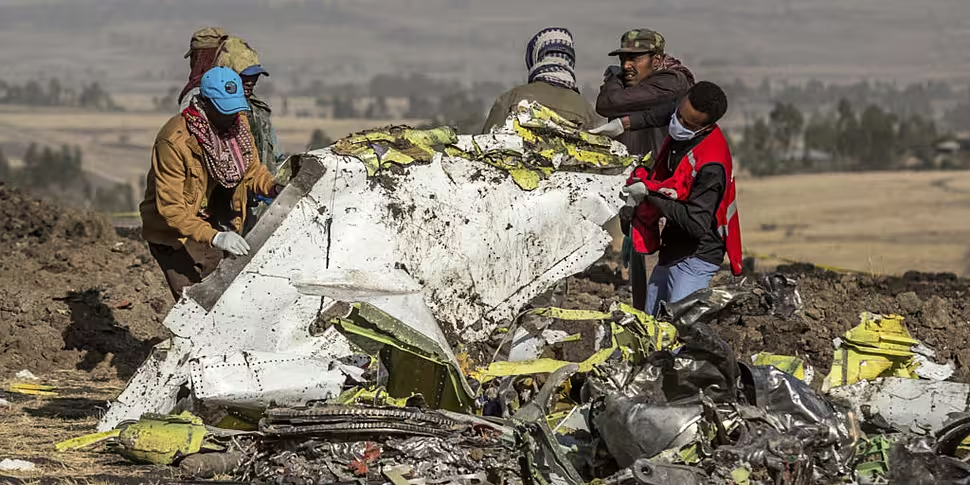The Ethiopian Airlines plane which crashed last month persistently nosedived despite pilots "repeatedly" performing the correct procedures recommended by Boeing.
Releasing a preliminary report into the crash on March 10th, Ethiopia's Transport Minister Dagmawit Moges said crew "performed all the procedures repeatedly" but they were "not able to control the aircraft".
Speaking to journalists in Ethiopia's capital Addis Ababa, Ms Moges said Boeing should review the aircraft control system and aviation authorities need to confirm the problem has been solved before allowing that model of plane back into the air.
"Since repetitive uncommanded aircraft nose down conditions are noticed... it is recommend that the aircraft control system shall be reviewed by the manufacturer," she said.
The Boeing 737 MAX 8 was grounded globally following the crash, which was the second deadly accident in six months involving the new model.
The Boeing jet crashed six minutes after take-off killing all 157 people onboard, including Irishman Micheál Ryan.
 Ethiopian Minister of Transport Dagmawit Moges addresses a press conference in Addis Ababa, about preliminary investigation results on Ethiopian Airlines flight ET 302 which crashed just minutes after takeoff from Bole International Airport | Image: Li Yan/Xinhua News Agency/PA Images
Ethiopian Minister of Transport Dagmawit Moges addresses a press conference in Addis Ababa, about preliminary investigation results on Ethiopian Airlines flight ET 302 which crashed just minutes after takeoff from Bole International Airport | Image: Li Yan/Xinhua News Agency/PA ImagesThe disaster came just five months after a Lion Air 737 MAX 8 crashed in Indonesia - killing all 189 passengers and crew.
The preliminary report into the Ethiopia crash did not provide a detailed analysis of the flight or what happened before the plane began to nosedive.
A more in-depth report is expected to take several months, before a final report is due within a year.
Ethiopian investigators are focusing most of their attention on recommendations directed at Boeing and regulators.
The plane "had an unstable vertical speed" after take-off, according to flight tracking website Flightradar24.
The day before its crash, the Lion Air jet also reported unusual variations in altitude and airspeed at the start of the flight.
The preliminary report into the Lion Air crash said pilots were unable to control the aircraft's Manoeuvring Characteristics Augmentation System (MCAS) software - a new automated anti-stall feature that repeatedly lowered the nose of the aircraft based on faulty data from a sensor.
The Ethiopian Airlines findings could ignite a debate with Boeing about how crew responded to problems triggered by faulty data from an airflow sensor, particularly over whether they steadied the plane before turning key software off.
Following the news conference, Ethiopian Airlines released a statement saying: "The preliminary report clearly showed that the Ethiopian Airlines pilots who were commanding flight ET302 have followed the Boeing recommended and FAA approved emergency procedures to handle the most difficult emergency situation created on the airplane.
"Despite their hard work and full compliance with the emergency procedures it was very unfortunate that they could not recover the plane from the persistence of nosediving.
"As the investigation continues with more detailed analysis as usual we will continue with our full co-operation with the investigation team."
#Ethiopia|n Airlines Statement on the Preliminary Report of the Accident on ET 302 pic.twitter.com/azAKxyptq8
— Ethiopian Airlines (@flyethiopian) April 4, 2019
The airline's group chief executive Tewolde GebreMariam said everyone at Ethiopian Airlines "are still going through deep mourning" and expressed "deep sympathy and condolences for the families' relatives and friends of the victims".
He added: "Meanwhile we are very proud of our pilots' compliance to follow the emergency procedures and high level of professional performances in such extremely difficult situations."









